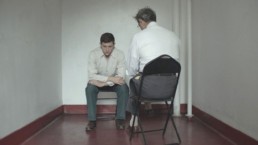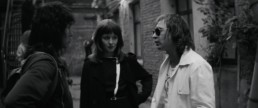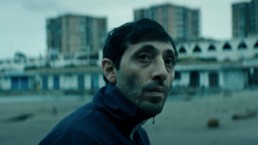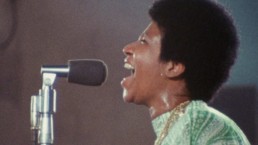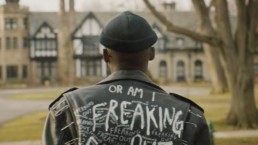'The Mountain' is a Psychological Summit
THE MOUNTAIN (2019)
Starring Tye Sheridan, Jeff Goldblum, Hannah Gross
Directed by Rick Alverson
Written by Rick Alverson, Dustin Guy Defa, Colm O'Leary
Distributed by Kino Lorber. 106 minutes. Opens this Friday at the Nuart Theatre.
With its grandly epic title alone, it's as if director Rick Alverson is announcing to audiences that The Mountain will be as equally challenging a feat, requiring active participation in order to keep up. And with its slowly unfolding and glacially moving pace, along with its serious, deliberate tone (mostly composed of silent internalizing), it certainly lives up to what could be that intention. While this summation could sound like a detractor, I don't think it's unfair, nor do I think it should even come across as a critique. Those who saw Alverson's previous film, 2015's Entertainment, should already be aware of the sort of perverse performative pleasure one might get in withholding and restricting the familiarity and easy accessibility that audiences are so expectant of with traditional narrative storytelling. The Mountain branches out from Entertainment's same sort of post-modern sensibility, but into a more dramatic and even more self-assured world, making for a larger and appreciated creative leap which mostly all holds together.
Credit the cast of The Mountain – working from a script co-written by Alverson, Dustin Guy, and Colm O'Leary – who commit to Alverson's avant-garde approach with this project. In this ambiguously '50s-set mid-west expanse, Andy (Tye Sheridan) works for his father, Frederick (Udo Kier), at the local skating rink. Andy longs to visit his mother, but it's his father who denies his son's desire as she is under psychiatric care at a state hospital. It's the offer of employment that Andy receives from Dr. Wallace Fiennes (Jeff Goldblum), Andy's mother's former physician, that gets him to join on a tour of hospitals, photographing the lobotomies that Dr. Wallace is to perform. What comprises The Mountain, along with momentary detours into abstract surrealism, is a series of pit stops through sterile hospital hallways and operating rooms, all populated with the vacantly staring faces of mental patients that gets Andy to question his own mental state, which is where the film explores the line between the accepted state of sanity and the insane.
It's these two states that come to life through the characters of Andy and Wally, both counter-balances who embody the opposing natures of man: Andy being stoic and observant countered with Wally's expressive and performative nature. Sheridan (who joins Alverson once again after a role in Entertainment) is tasked with holding the abstractly air-tight tone of the film together, and at only 22 years old, shows that he has the commanding presence to do so. Sheridan's withheld performance counters the eccentric yet poised performance of Jeff Goldblum's debonaire doctor, which is a continual point of entertainment in the film. There's a small wealth of other actors that fill out the rest of this world, including Hannah Gross (Mindhunter) as a transfixing young lobotomy patient who catches Andy's eye. And no review would be complete without the mention of Denis Lavant as Jack, Hannah's father and expressive philosophizer who, when his character is revealed in the film's third act, maniacally contorts and drools his way into embodying the film's very question of lunacy or not.
The Mountain is a challenging film – nearly Lynchian in its ambiguity at times – which will likely deter a large majority of viewers. But it's undeniable that Rick Alverson is realizing a vision of complex questions and ideas. If nothing else, audiences should be able to acknowledge the production elements that make this film so visually and sonically distinct: the cinematography (by Lorenzo Hagerman) feels like an old faded Polaroid photo come to life at any moment, and the score (by Robert Donne) is a sneakily arresting arrangement of musical cues and sounds that conjure the film's ranging emotional unrest. To the photography's end, notice how formally composed nearly every element in the film is, begging to be pointed out by the viewer as being a total construction and fabrication. Perhaps the film's entire philosophy is summed up when Andy asks Jack about a painting of a mountain hung up on Jack's home wall: Jack snarls and seethes back that it is not a mountain – that it is just a picture. Whether or not the film is aware that it directly acknowledges René Magritte's famous painting "The Treachery of Images" (in which the picture of a pipe is accompanied with the words: This is Not a Pipe), the film shows its hand at being just as disingenuous a production, imploding the entire question of the surrealist dilemma on display. It's sane people play-pretending as the doctor and the psychotic. Yes, that's Jeff Goldblum. It's all both real and fake, sane and insane and all at the same time. It's both a mountain and it's just a picture, whichever way you view it.
'The Mountain' made its world premiere at the Venice Film Festival, showed at this year's Sundance Film Festival, and was included in the Red Bull Music Festival Los Angeles as part of the Center Channel film program, originally posted on February 11, 2019.
Rolling Stones Bassist Reflects in 'The Quiet One' Doc
THE QUIET ONE (2019)
Starring Bill Wyman, Suzanne Accosta, Tony Chapman
Directed by Oliver Murray
Written by Oliver Murray
Distributed by Sundance Selects. 109 minutes. Now playing at Laemmle Monica Film Center and available to stream on demand.
It takes a certain type of character to be a bass player in a rock band. Not being watched like the lead singer or lead guitarist, and getting overpowered by the drummer, unless you're Paul McCartney, it's an egoless job, providing subdued unifying groove to unite all instruments. They also have a chance to observe, apart from the insanity. And when you're the bassist in the largest rock band in the world, as Bill Wyman shows, it's an even more impressive journey.
The Quiet One is a documentary that follows Wyman, the long-standing bassist of the Stones from the beginning through their last tour in the nineties. The Quiet One seeks to give a modest spotlight to a humble figure, a man who wasn't Mick or Keith.
Most impressively, he was a proper archivist. Starting out in an archive – almost a library – we see bookshelves of boxes, layered with years' memories. Cameras of all kinds, instruments, posters, and buttons, all annotated in a neat fashion. The mapping that goes on might be the opposite of Keith Richards' life, who says in the film when questioned for details of their illustrious history, "You'd have to ask Bill Wyman."
The documentary is insightful for this reason: it's the story of the Stones as told by the guy who wasn't just there but witnessed everything firsthand. Wyman provides moving interviews that detail "Stones-mania," the death of first guitarist Brian Jones, and Altamont Speedway, among others. He even provides more personal stories, including failed marriages and the brutality of the rock & roll lifestyle.
The Quiet One really lures you in without seeing Wyman as he is today (until the end), and his voiceover is accompanied by photos and videos. I wish the film would have had him sit for an interview where he could recall specific questions so that we could understand what these things all meant to him, but it's largely a biography for us to glean meaning.
It's pointed out that Wyman, who learned to archive from his grandmother, might be organizing these memories in order to show who he was to himself; a retrospective of his own life's work, curated by himself.
'Yesterday' Imagines a World Where There's No Beatles
YESTERDAY (2019)
Starring Himesh Patel, Lily James, Ed Sheeran
Directed by Danny Boyle
Written by Jack Barth, Richard Curtis
Distributed by Universal Pictures. 116 minutes. Opening this Friday in theaters everywhere.
Imagine there's no ‘Beatles’... That's the concept behind Yesterday, the latest film from director Danny Boyle (Slumdog Millionaire), which imagines waking up in a world where the Fab Four and all of their world-changing music never existed. Based on a story by Jack Barth and screenplay by Richard Curtis (Love Actually), Yesterday is a crowd-pleasing hit that mostly plays to its feel-good emotions, but will no doubt connect with Beatles fans.
Jack (newcomer Himesh Patel) is a struggling musician, playing his original songs to unimpressed crowds at empty boardwalks and coffee shops, except for his friend and manager Ellie (Lily James) who might harbor more than friendly feelings for him. Jack's ready to call it quits when a power surge strikes across the globe, landing Jack in the hospital. Presented with a guitar the following morning, Jack strums out a rendition of Paul McCartney's "Yesterday." When he finishes, his audience isn't just pleased: they're utterly speechless, asking Jack when did he write such a beautiful song. Jack, bewildered, soon finds that not only have they never heard the song before but that he's living in a world where The Beatles didn't exist.
As a film, Yesterday is crafted fully on feel-good vibes, making for an easy-watching and ultimately pleasing time (to watch the film surrounded by people laughing and enjoying the same moments is probably the best way to do it). The reveal of the twist in the first act creates many memorable moments that are the film's most special parts. And there's also a good onscreen ensemble to provide charm as well: Ed Sheeran (as himself) makes more than a cameo here, and Kate McKinnon steals the show when she arrives as Jack's sleazy agent. While Himesh as Jack is good-to-serviceable in the role, Lily James relays full star-power onscreen, providing all of the heart that the film has to offer.
Having said that, Yesterday has a large hurdle it needs to clear, and one that I'm not sure it committed to taking on fully: how do you re-present arguably the best pop songs ever written an audience in a way that will showcase how brilliant they are as well as the songwriting on display? The angle that Yesterday seems to take is that Jack "writes" these more than well-structured songs under time crunches – in some cases, instantly. And while I was enjoying tapping my feet to songs like "I Want to Hold Your Hand" and "Back in the USSR," I wasn't blown away by any new perspective on any song here (save for the inclusion of "The Long and Winding Road," whose time-stopping performance was what the film needed even more of).
Perhaps somewhat ironically (although maybe not un-coincidentally), Yesterday doesn't chart any new territory, staying surface-level on the themes of authenticity and not doing any more inventive storytelling. There's some fun that's had with Jack trying to remember all of the lyrics to some of the more obtusely colorful songs, but what would it have been like if Jack put his own twist on any of these songs? How would The Beatles more psychedelically sounding and paradigm-shifting songs affect this modern culture, and what would the state of the world even look like if we were deprived of songs like "Let it Be" and "Hey Jude"? Perhaps that version of the movie would have more aptly been titled "Tomorrow Never Knows," and we as an audience will have to enjoy those thoughts on our own. But what we have is Yesterday and the pleasing yet familiar stylings that come with it.
'Leto' Brings Rock & Roll to Russia
LETO (2018)
Starring Teo Yoo, Irina Starshenbaum, Roman Bilyk
Directed by Kirill Serebrennikov
Written by Mikhail Idov, Lily Idova, Kirill Serebrennikov
Distributed by Gunpowder & Sky. 126 minutes. Opening this Friday at Laemmle's Ahrya Fine Arts Theatre.
If the thought of older American generations shaking their heads in disapproval at rock & roll corrupting the youth sounds restrictive, think about how the new sound and scene must have been received by countries who don't practice democracy. To these hard-clamped oppressive states, the likes of David Bowie, Talking Heads, and The Velvet Underground weren't just a bunch of distasteful degenerates– they were the very threat to their nation's politics and identity.
Although rock music may evoke images of uninspired and detached long-haired rockers, it was still the music that artists sought to create. The new, explosive energy and creativity which deviated from all prior norms is the story of rock & roll. This is the story of Leto.
Set in the late eighties, Leningrad, Leto (meaning "summer") captures the time when Western rock inspired a new sort of Russian youth, following the people who forged a new slacker identity amidst their hammer and sickle party. Leto follows shades-wearing Mayk (Roman Billy), the unofficial ambassador to this new sound and look for Russian rockers: not only does he front his own rock band and smuggle in vinyl pressings of the latest Blondie and T. Rex albums, but he's the unofficial middle-man between the rocker and the statesman, mediating with local theater owners and officials in order to get their music approved so as to be played to a (seated) audience.
Photographed in black and white, the camera of Leto floats through various locations, bringing enough dreaminess that feels both immediate and fantasy-like that it channels the visual stylings of last year's memory palace movie Roma. It's coincidental then that, like Roma, Leto is a piece that also attempts to channel the spirits of real-life people, as the film's director Kirill Serebrennikov based certain characters on people from Russian history.
For being a film about the arrival of rock and roll in Communist Russia, the film wonderfully channels the same rebellious spirit of rock, as far as not being afraid to not conform to one single idea. A Palme d'Or nominee at 2018's Cannes Film Festival, Leto is largely devoid of a plot, save for the arrival of a new guitar-strapped rocker Viktor (Teo Yoo) who Mayk takes under his wing and mentors, all while his wife Natasha (Irina Starshenbaum) looks upon the new lad with interest. But what Leto does receive in turn is freedom, re-creating a time and energy that dips into stylistic swerves whenever the inspiration strikes. The film does randomly launch into reality-detaching musical moments such as when a full staging of Talking Heads' "Psycho Killer" naturally becomes a part of a scene, similar to how any musical moment might arise in Across the Universe. And yet these are among the best moments in the movie (Leto won the Cannes Soundtrack Award).
To this end, the mash-up of genres with clashes of form and ideas fits its overall theme – that being about identity crisis. Some might find Leto's construction a bit too loose and inconsistently built. But along with its aesthetic eye, fantastically rocking music, and freedom to take chances whenever it wishes to, the film plays to its most inspired strengths to inspire future rock and rollers.
Alex Ross Perry Shares the Songs That Inspired 'Her Smell'
Director Alex Ross Perry has come to be known as a meticulous and exact filmmaker, and it might surprise fans to know just how much of an absolute music-head he is. Perry's latest film – 'Her Smell' – is a total swerve into a booze-drenched rockstar life in which Elisabeth Moss plays a drug-addled punk rocker. To promote the movie – in Los Angeles theaters today – I asked Perry's people if he would be able to put together a list of songs that inspired 'Her Smell'. As it turned out, Perry put together a curated list of ten(ish) songs that influenced the film (thanks for giving me a chance to make another compulsive list). His knowledge of 90s grunge rock deep cuts is great, so much so that I had to ask him for spelling at one point.
I spoke with the Brooklyn-based director on the phone where he walked me through the songs. Check out the playlist below before checking out 'Her Smell' in Los Angeles this weekend.
"The Shame" by The Blood Brothers
https://open.spotify.com/track/3xPrbQzXcBvN5zYC61b2vq?si=T1IQDIiDTRG-JrcoU0a7yQ
This was the place holder in the script before "Another Girl, Another Planet" became the only choice to open the movie with. I was really listening to those lyrics, "I always flirt with death," and I knew that had to be the first thing Becky says in the movie. But prior to that though, I always thought that The Blood Brothers' song "The Shame" would be the first song.
It's a song I love from a band that really meant a lot to me. The chorus is "Everything's going to be just awful when we're around," and I was like, yeah, that's Becky. That's this movie.
"Don't Cry" by Guns N' Roses
https://open.spotify.com/track/2N2yrmodOnVF10mKvItC9P?si=axbkbKQgTEWrNM0T9mrAIA
In Act Two, when Becky's in the recording studio, it starts and ends with an original song. And I described that original song to Alicia [Bognanno, of the band Bully] as like, "this just has to sound like a really rough demo of a song that will later potentially be very good." So I sent her a demo of "Don't Cry" from Use Your Illusion. That's an example of not a good sounding demo which became just an incredible song. In fact, it's so good they put it on both Use Your Illusion I and II.
"Because You're Young" and "We're Coming Back" by Cock Sparrer
https://open.spotify.com/track/2j1KMnU8ZBBWqB9B3I2RN8?si=PWu8dFfxRPG_1LhUOwUrYw
There's this moment in the studio where Becky meets The Akergirls. I wanted her to just grab a guitar and start playing a song that feels like it's somehow commenting on what's happening in the movie. That song ended up being "Because You're Young" by Cock Sparrer.
https://open.spotify.com/track/4YnYtYWBmDM8YjfMMK0cqs?si=NGqGTTQSSD-wBmSR_ieBHw
But I got to that song because originally I was thinking of the Cock Sparrer song "We're Coming Back." So I kind of swapped out one Cock Sparrer song for another. The lyrics of "We're Coming Back" go like this, "You remember out there somewhere, you've got a friend, you'll never walk alone again." I was like, this is clearly what Becky is searching for. And clearly, the message that The Akergirls are here at that moment, even though we know that this is not going to go well. But I actually thought it was a little too positive. So in exploring other Cock Sparrer songs, came up with "Because You're Young" which goes, "You never listen to anyone because you're young." That also comments on The Akergirls in a way.
"We're Coming Back" is an older song, and "Because You're Young" was actually off of a Cock Sparrer album from like, just before the events of that sequence take place. I liked the idea that it's just on Becky's mind because she's really been enjoying that record. That kind of fit in perfectly.
"The Great Rock'n'Roll Swindle" by The Sex Pistols and "Journey to the End of the East Bay" by Rancid
https://www.youtube.com/watch?v=hXc1g_LHwmc
And then for the finale, I gave Alicia [Bognanno] "The Great Rock'n'Roll Swindle." In the script, it said the song is a narrative journey about being in a band with opportunities for every woman on stage to sing a couple of lines. I compared it to this song from The Sex Pistols film of the same name, which is the story of The Sex Pistols told two lines at a time by each member of the band. By that time, the band had broken up, and Johnny Rotten only sings two lines in the song, and the rest of it is sung by not just the band, but the cast of the movie.
https://open.spotify.com/track/301rOc8VF34Op3NhRfYcus?si=opEryrUVTbuoSttp_EBaDQ
I said I wanted the finale to be a narrative like "The Great Rock'n'Roll Swindle" or the Rancid song "Journey to the End of the East Bay," which is about the story of Operation Ivy and their rise and break up. I was like, these are great catchy lines where six different women can each take a line or two, but also the lyrics of the songs are incredibly narrative.
Those are some of the men. So now, falling over to the back half: (starting with) the song "Blue" by Elastica; specifically the live version that's on YouTube from Glastonbury.
"Blue" by Elastica (Live at Glastonbury)
https://www.youtube.com/watch?v=Ew7QoNGHung
Agyness Deyn (Marielle Hell) and I were sending Lizzy (Elisabeth Moss) a lot of music because Lizzy, by her own admission, had never listened to very much or any of this new stuff. Agyness is like an encyclopedia of all punk music, all female music from the 70s, 80s, and 90s. She grew up in Manchester and her taste is impeccable. I thought I was going to be the one educating people, and she educated me – not even just about the songs because I know that song and I know that album.
When Lizzy saw this Glastonbury performance after all the songs we'd sent, she was like, this is what I think the band feels like: dual female harmonies, it's not really punk, it's not really pop, it's catchy, it has the guitar chords and rhythms of punk. It's a song that you can play at a festival of 30,000 fans.
"Tell the World" by Vivian Girls
https://open.spotify.com/track/0kf7kUyMVHOD8nNThEo4kc?si=gR_uz1LQR_a6l-7jo6YL-A
This is a Vivian Girls song called "Tell the World" that I really like. Vivian Girls is a band I listened to in New York like 10 years ago when I was working at Kim's Video. My friend Ames Scott was friends with the band and he turned me on to them. We had their seven inch before they got big and Ames was like, this is it, this is the future, this is the next thing. I was so into their music, I met some of them a couple of times through him – although I'm sure they don't remember. I think the Vivian Girls are really, really incredible and kind of didn't get their due. Vivian Girls were on my mind a lot while writing this movie.
I think a lot of their music really holds up, there's something low-fi and catchy about it. But as a trio, they were something that I was thinking about for both Something She and The Akergirls. The song "Tell the World" has this perfectly fuzzy, distorted rawness to it that kind of sounded like a song from the 60s, 70s, 80s, and 90s.
"Fuck and Run" by Liz Phair (Live at Matador 21st Anniversary)
https://www.youtube.com/watch?v=3DFpJBEKugY
It was kind of a late in the game idea, but there's a video on YouTube of Liz Phair performing her song, "Fuck and Run" from the Matador 21st Anniversary celebration. And it's one of my favorite songs off of Exile in Guyville, period. In the live version, she's joined on stage by Ted Leo, which had nothing to do with her music or anything, but for some reason, he walks out on stage with a tambourine to join her on this song. It just feels like you can picture being at this big celebration where 15 bands are playing one or two of their most popular songs. And then everyone just kind of comes out and jams with each other.
So that song in general – and her in general – but specifically this video of her performing at this kind of big anniversary celebration was really on my mind a lot. And I look at that video pretty often.
"No Looking" by The Raincoats and "Hollywood Dream" by The Runaways
https://open.spotify.com/track/1rANkGdRoHdiZYcOG63TuW?si=7WSSXoROTuSbF0ihFrrQkA
The last two songs are The Raincoats song "No Looking," and The Runaways song "Hollywood Dream." "No Looking" is just a song that plays over the end credits of the movie. So this is the one that's kind of a cheat: that song is like a tonal finality in the way that it sounds like it's coming from both the left and right speaker and then it just comes together at the end. That is like Her Smell in a microcosm to me.
That song was very inspirational. The Raincoats are essential, a big bang of all of this female punk music, and certainly one of the earliest and most important acts that we looked at. That song really was on my mind a lot when thinking about how to end the movie.
https://www.youtube.com/watch?v=WuHIX05rVZ8
And then The Runaways' "Hollywood Dream" is the song I've always loved. I would describe the last 10 minutes of Her Smell as a Hollywood ending with a big reunion. Every character in the movie is there. Everyone gets to see feedback. You have a moment of triumph. Becky's daughter runs into her arms, a Hollywood ending. And then, this deep cut Runaways song. The only ending for a Hollywood ending is "Hollywood Dream," in my opinion. You end this movie about women in rock by throwing it back to The Runaways, it's just like the circle is closed.
It's a very obscure song, it was a B-side on a live album that might even be a bootleg, and it's always been on YouTube. And we pulled it off YouTube to edit with and then when we had to get it for the sound mix, Universal Music Group had to create it for us because there was no proper version... it's not on iTunes or Spotify or anything. It was a fun, deep cut. Even if you love The Runaways, maybe you haven't heard this. Those were the two songs that speak to what the ending is meant to feel like.
Here's the full playlist:
https://open.spotify.com/user/21rg4fgfopi9y8cdyk8w41jq0/playlist/3Jaw2EhAELiaViYxXoOP5u?si=0DkvZogtQryEaMBvJJSbUQ
Interview has been edited for clarity and length
'Dogman' Review: The Obedient and the Untameable
DOGMAN (2018)
Starring Marcello Fonte, Edoardo Pesce, Nunzia Schiano
Directed by Matteo Garrone
Screenplay by Ugo Chiti, Matteo Garone, Massimo Gaudioso
Distributed by Magnolia. 103 minutes. Not Rated.
It's right there in the title, begging for the audience to ask the question: are humans really separate from our animal ancestry? Dogman explores what it means to be a human and animal all at the same time, whether those are obedient or wild and untamed. This Italian drama, which was nominated for the Palm d'Or at the 2018 Cannes Film Festival, is a dark tale that explores the very nature of morality when a person reaches their breaking point.
Marcello (Marcello Fonte) is a meek and mousy dog groomer, whose own frail figure resembles that of a timid chihuahua. Marcello's gentle soul allows him to form connections with dogs of all kinds, as well as with the other men of stature in town, including the brutish Simoncino (Edoardo Pesce), whose violent outbursts have made the town turn on him. It's Simoncino who coaxes Marcello into unlawful events, whether it's driving him to burglaries or having him peddle snuff which Marcello does. Things ultimately lead to new heights when Simoncino involves Marcello in a planned burglary against a fellow local, to which Marcello faces his breaking point: will he stay a trained, obedient dog? Or will he go rabid?
Dogman is an altogether gripping watch, composed of darkly lit shots of a town that has a small radius for the film, figuratively resembling Marcello's bleak life there. If there's a lack of geographic locations, Dogman covers a lot of ethical, moral space for audiences to think about. Marcello's performance as the character of the same name is transfixing, his oversized and gummy smile showing his empathy and kindness, and his love for his daughter and dogs shows the purity of his soul – that is, until the stakes are at their highest and he faces more violent ambitions (he received the award for Best Actor at the 2018 Cannes Film Festival). If you're looking for a dark, gritty dose of Italian cinema that will make you re-look at humans and animals alike, Dogman is the movie for you.
Now playing at the Landmark Nuart.
'Amazing Grace' Bursts With Soul
Bursting its way onto the big screen, Amazing Grace is a concert film that will blow you away. While audiences may be familiar with Aretha Franklin's hits, few have heard the 'Queen of Soul' sing Gospel. And to not only hear her but also watch her sing Gospel is to witness the divine.
Taking place over two nights at the New Temple Missionary Baptist Church in Los Angeles, Amazing Grace is a collection of moments where you're either clapping and dancing in your chair, feeling the tears stream down your face, or trying to catch your breath. The live recorded album – backed by a full band – would go on to become the best selling Gospel album of all time.
Shot by famed film director Sydney Pollack in 1972 with the backing of Warner Brothers Music, over 20 hours of footage was captured to bring this epic anthem to life. However, for technical difficulties and monumental editing challenges- like matching Aretha's vocals to the picture (Pollack didn't use a clapboard to sync the takes)- the film was ultimately shelved. Until now.
Amazing Grace features Aretha singing alongside the Southern California Community Choir, which is, collectively, as equal a force to Aretha. Conducted by Alexander Hamilton, he is a charismatic star in his own right. And Aretha's brother, Reverend James Cleveland, who plays piano and evangelizes throughout is great.
Then there is Aretha herself. At just 29 years old, to watch her sing is so immaculate and divine. Her voice is like having heaven come down for that hour and a half. It is further proof that legends like her can inspire, touch, shake, and move humanity. Amazing Grace captures a moment in time that should inspire this and future generations for time to come.
AMAZING GRACE (2019)
Starring Aretha Frankin, Reverend James Cleveland, C.L. Franklin
Directed by Sydney Pollack
Distributed by Neon. 87 minutes. Rated G
In 'Native Son', a Literary Classic gets a Modern, Punk Adaptation
'Native Son' opened this year's Sundance Film festival at the Eccles theater where it played as part of the US Dramatic competition. Upon the end of the film's screening, it received large audience applause in which its director – first-time feature filmmaker Rashid Johnson – and cast – including Ashton Sanders, KiKi Lane, and Nick Robinson were all in attendance. Here's our quick take on what you need to know about the film.
Native Son is the story of a young, low-income African American male who, after securing employment in the world of a wealthy white family, finds himself at the center of an accidental death that puts him in the direct cross-hairs of cultural tensions. Adapted from the classic 1940 novel, first time feature film director Rashid Johnson (along with Pulitzer Prize-winning screenwriter Suzan-Lori Parks) have made this updated version entirely their own: by highlighting the story's underlying social issues and wrapping them up in his polished punk aesthetic, it's a story that feels as timely now as it must have been then.
Visual contemporary artist Rashid Johnson's previous work is in diverse mediums such as painting and sculpting. But with Native Son, his feature film debut, he brings an experienced visual eye to the project, which is the film's most seductive and impactful quality. Where Johnson most noticeably swerves from the source novel, is in the depiction of our protagonist, Bigger (Ashton Sanders), or "Big," as the neighborhood calls him. With his cropped green buzz cut and safety pinned leather jacket, Big is the epitome of visual identity exploded. He challenges both personal and racial expectations of what "blackness" should be by listening to such diverse and non-hip-hop music as Bad Brains and Beethoven. You'll remember Ashton Sanders as teenage Chiron from last year's Best Picture winner Moonlight, and here again, Sanders plays a cryptically reserved character. But as he slinks his way around the streets of North Chicago, he brings a new level of magnetism and menace to his acting range.
Rashid Johnson also succeeds in bringing wonderful talent to the movie: there's KiKi Lane, who most recently gained name recognition by starring in the acclaimed If Beale Street Could Talk, here playing Big's girlfriend Bessie; Nick Robinson plays Jan, as impoverished young activist; and the captivating Margaret Qualley plays Mary Dalton, the alluring daughter of Big's new employer (an always wonderful Bill Camp plays Mr. Dalton). They, along with the rest of the actors in this film, are so perfectly cast together that – to put it in art terms – feels like the right mixture of harmonious colors in Johnson's artistic palette.
It's undeniable that Rashid Johnson is a flourishing visual artist and one who we should all be watching to see what he does next. The biggest obstacle holding Native Son back from being even more impactful is in the jumps in its tonal shifts, which happen when the story plays on and the stakes are raised. The story's pivotal and climactic plot point is surprising, but this hard crank of the wheel feels a bit disorienting. The fallout of this moment leads the movie to make a statement that we didn't know it would have to make. Yet for this slight distraction, it would be wrong to not also acknowledge the number of complex ideas, all stylized through Johnson's artistic formats. It's no wonder why HBO bought the film from A24 hours before the film made its world premiere at the Sundance festival.
'Native Son' will be available to stream on HBO this Saturday.

